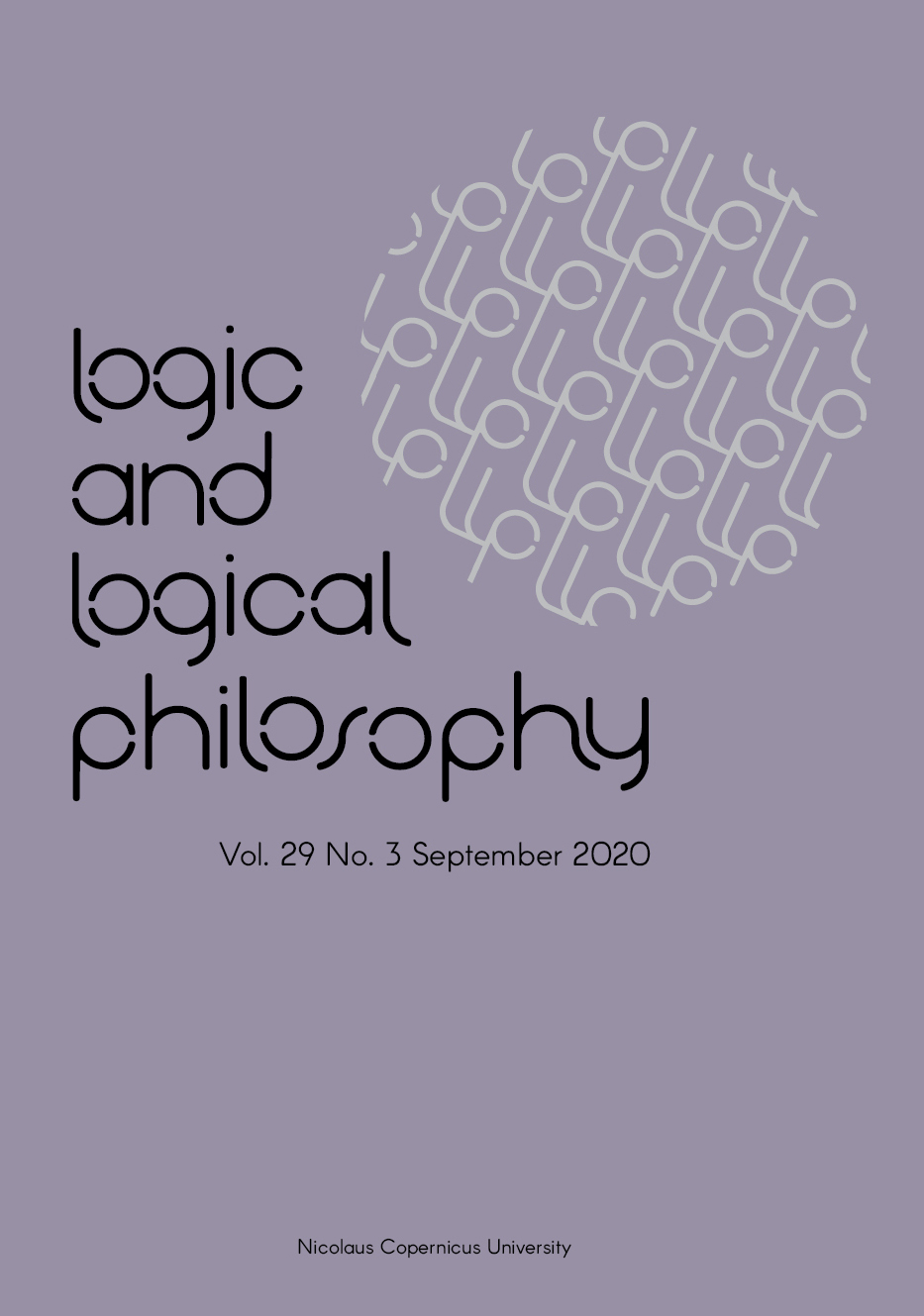On Logic of Strictly-Deontic Modalities. A Semantic and Tableau Approach
DOI:
https://doi.org/10.12775/LLP.2020.010Keywords
deontic logic, deontic relationship, relating logic, relating semantics, quasi-deontic modalities, strictly-deontic modalities, tableau approachAbstract
Standard deontic logic (SDL) is defined on the basis of possible world semantics and is a logic of alethic-deontic modalities rather than deontic modalities alone. The interpretation of the concepts of obligation and permission comes down exclusively to the logical value that a sentence adopts for the accessible deontic alternatives. Here, we set forth a different approach, this being a logic which additionally takes into consideration whether sentences stand in relation to the normative system or to the system of values under which we predicate the deontic qualifications. By taking this aspect into account, we arrive at a logical system which preserves laws proper to a deontic logic but where the standard paradoxes of deontic logic do not arise. It is a logic of strictly-deontic modalities DR.
References
Carmo, J., and A. Jones, 2002, “Deontic logic and contrary-to-duties”, pages 147–264 in D.M. Gabbay and F. Guenthner (eds.), Handbook of Philosophical Logic, vol. 8, Springer Science+Business Media. DOI: http://dx.doi.org/ 10.1007/978-94-010-0387-2_4
Chellas, B, 1980, Modal Logic. An Introduction, Cambridge University Press, Cambridge.
Cheng, J., and T. Tagawa, 2002, “Deontic relevant logic. A strong relevant logic approach to removing paradoxes from deontic logic”, pages 39–48 in M. Ishizuka and A. Sattar (eds.), PRICAI 2002. Trends in Artificial Intelligence, Springer-Verlag, Berlin/Heidelberg/New York. DOI: http://dx.doi.org/10.1007/3-540-45683-X_7
Epstein, R., 1979, “Relatedness and implication” Philosophical Studies 36 (2): 137–173. DOI: http://dx.doi.org/10.1007/BF00354267
Epstein, R. (with the assistance and collaboration of: W. Carnielli, I. D’Ottaviano, S. Krajewski, R. Maddux), 1990, The Semantic Foundations of Logic. Volume 1. Propositional Logics, Springer Science+Business Media, Dordrecht. DOI: http://dx.doi.org/10.1007/978-94-009-0525-2
Goré, R, 1999, “Tableau methods for modal and temporal logics”, pages 297–396 in M. D’Agostion, D. Gabbay, R. Hähnle and J. Posegga (eds.), Handbook of Tableau Methods, Springer Science+Business Media, Dordrecht. DOI: http://dx.doi.org/10.1007/978-94-017-1754-0_6
Hansen, J., 2001, “Set, sentences, and some logics about imperatives”, Fundamenta Informaticae 48 (2–3): 205–226.
Hilpinen, R., 2001, “Deontic logic”, pages 159–182 in L. Goble (ed.), Blackwell guide to philosophical logic, Blackwell Publisher Ltd., Oxford. DOI: http://dx.doi.org/10.1002/9781405164801
Hilpinen, R., and P. McNamara, 2013, “Deontic logic. A historical survey and introduction”, pages 3–136 in D. Gabbay, J. Horty, X. Parent, R. van der Meyden and L. van der Torre (eds.), Handbook of Deontic Logic and Normative Systems, College Publications.
Hintikka, J., 1969, “Deontic logic and its philosophical morals”, pages 184–214 in J. Hintikka, Models for Modalities, Springer, Dordrecht. DOI: http://dx.doi.org/10.1007/978-94-010-1711-4_9
Horty, J., 1997, “Nonmonotonic foundations for deontic logic”, pages 11–44 in D. Nute (ed.), Defeasible Deontic Logic, Springer, Dordrecht. DOI: http://dx.doi.org/10.1007/978-94-015-8851-5_2
Jarmużek, T., 2013, Formalizacja metod tablicowych dla logik zdań i logik nazw (Formalization of tableau methods for propositional logics and for logics of names), Wydawnictwo UMK, Toruń.
Jarmużek, T., 2014, “Tableau metatheorem for modal logics”, pages 103–126 in R. Ciuni, H. Wansing and C. Willkomennen (eds.), Recent Trends in Philosophical Logic, Trends in Logic, vol. 41, Springer International Publishing. DOI: http://dx.doi.org/10.1007/978-3-319-06080-4_8
Jarmużek, T., 2020, “Relating semantics as fine-grained semantics for intensional propositional logics”, accepted for publication in J. Malinowski et al. (eds.), Logic in High Definition. Current Issues in Logical Semantics, Springer.
Jarmużek, T., and B. Kaczkowski, 2014, “On some logic with a relation imposed on formulae. Tableau system F”, Bulletin of the Section of Logic 43 (1/2): 53–72.
Jarmużek, T., and M. Klonowski, 2020, “Some intensional logics defined by relating semantics and tableau systems”, accepted for publication in J. Malinowski et al. (eds.), Logic in High Definition. Current Issues in Logical Semantics, Springer.
Jarmużek, T., and J. Malinowski, 2019a, “Boolean connexive logics. Semantics and tableau approach”, Logic and Logical Philosophy 28 (3): 427–448. DOI: http://dx.doi.org/10.12775/LLP.2019.003
Jarmużek, T., and J. Malinowski, 2019b, “Modal Boolean connexive logics. Semantics and tableau approach”, Bulletin of the Section of Logic 48 (3): 213–243. DOI: http://dx.doi.org/10.18778/0138-0680.48.3.05
Kulicki, P., and R. Trypuz, 2015, “On deontic action logics based on Boolean algebra”, Journal of Logic and Computation 25 (5): 1241–1260. DOI: http://dx.doi.org/10.1007/978-94-007-7046-1_5
Lokhorst, G.-J., 2006, “Andersonian deontic logic, propositional quantification, and Mally”, Notre Dame Journal of Formal Logic 49 (1): 385–395. DOI: http://dx.doi.org/10.1305/ndjfl/1163775445
Lokhorst, G.-J., 2008, “Anderson’s relevant deontic and eubouliatic systems”, Notre Dame Journal of Formal Logic 49 (1): 65–73. DOI: http://dx.doi.org/10.1215/00294527-2007-004
Makinson, D., and L. van der Torre, 2000, “Input/output logics”, Journal of Philosophical Logic 29 (4): 383–408. DOI: http://dx.doi.org/10.1023/A:1004748624537
Pietruszczak, A., and T. Jarmużek, 2018, “Pure modal logic of names and tableau systems”, Studia Logica 106 (6): 1261–1289. DOI: http://dx.doi.org/10.1007/s11225-018-9788-6
Priest, G., 2008, An Introduction to Non-classical Logic, Cambridge University Press, New York. DOI: http://dx.doi.org/10.1017/CBO9780511801174
Prior, A., 1958, “Escapism. The logical basis of ethics”, pages 135–146 in A.I. Melden (ed.), Essays in Moral Philosophy, University of Washington Press, Seattle.
Prior, A., 1954, “The paradoxes of derived obligation”, Mind 63: 64–65. DOI: http://dx.doi.org/10.1093/mind/LXIII.249.64
Read, S., 2012, Relevant Logic. A Philosophical Examination of Inferences, retrieved from http://www.st-andrews.ac.uk/~slr/Relevant_Logic.pdf. (First published by Basil Blackwell 1988.)
Ross, A., 1941, “Imperatives and logic”, Theoria 7: 53–71.
Solt, K., 1984, “Deontic alternative worlds and the truth-value of ‘OA’”, Logique & Analyse 27 (107): 349–351.
Stelzner, W., 1992, „Relevant deontic logic”, Journal of Philosophical Logic 21: 193–216. DOI: http://dx.doi.org/10.1007/BF00248639
Walton, D., 1979, “Philosophical basis of relatedness logic”, Philosophical Studies 36 (2): 115–136. DOI: http://dx.doi.org/10.1007/BF00354266
Wansing, H., 1998, „Nested deontic modalities. Another view of parking on highways”, Erkenntnis 49 (2): 185–199. DOI: http://dx.doi.org/10.1023/A:1005463529426
Wright, G. von, 1980, “Problems and prospects of deontic logic”, pages 399–423 in E. Agazzi (ed.), Modern Logic. A Survey, D. Reidel, Dordrecht. DOI: http://dx.doi.org/10.1007/978-94-009-9056-2_22
Downloads
Published
How to Cite
Issue
Section
Stats
Number of views and downloads: 1202
Number of citations: 8







